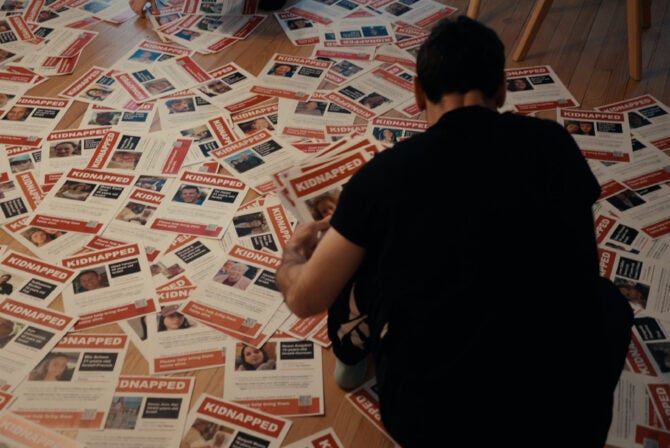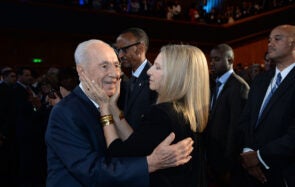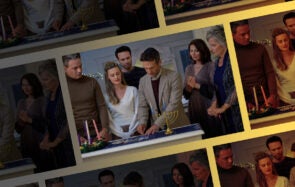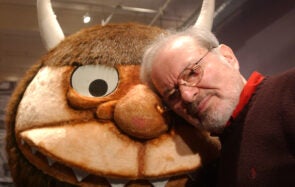“Do you want to know the gender?” the eager genetic counselor asked on the other end of the phone line.
I momentarily considered doing what my husband and I had discussed—asking her to call me back and leave a voicemail, so that we could both listen to the news together. But the pragmatic and impatient me won out over the romantic, and I simply said, “Sure.”
“It’s a boy!” I could practically hear the virtual champagne bottles popping and balloons floating in her voice, as she anticipated shrieks of delight from me, a mother of a daughter who now would also have a son.
“Wow,” I faked half-heartedly. “That’s great, thanks.”
I hung up the phone, a little shocked, substantially disappointed, and significantly anxious. For no reason in particular, I had always assumed we would have two daughters—sisters. Number two would wear all of number one’s hand-me-downs, the two would march inseparably through life, making each other crowns of daisies in childhood, traveling together to Mexico through late adolescence, and raising families together into adulthood.
The loss of that fantasy came crashing down upon me as I suddenly felt the weight of the decision that lay ahead. The decision that my husband and I had been hoping to avoid since we had started talking about having children almost 10 years prior. The decision of whether or not to circumcise a son.
My husband was raised in Southern California—half-Jewish, full New Age. He has never put a lot of stock in tradition for its own sake. He finds the idea of flowers on Valentine’s Day almost ludicrous, and balks at seasonal normalcies like apple-picking in the fall or celebrating Christmas on December 25th.
I grew up in New York, 100% Upper East Side Jew, zero percent New Age. Bagels and lox for Yom Kippur break fast and dressing up for Passover seder were valuable because they were what was done, and they were what was done because they were valuable.
When I became a family doctor, I performed dozens of circumcisions during my residency training. The procedure was straightforward and seemingly not very painful to the baby.
The parents in the room were self-selecting—the too-emotional moms and fainting-prone dads would stay in their hospital rooms, but some parents, the curious or the overbearing, would stand next to me, watching as I took their sons’ cosmetic genital fate into my hands. Some babies cried, and some did not, and the whole procedure took five minutes, ending with a grand reveal of the shiny new genitalia, a giant gob of Vaseline, and a sheet of paper about aftercare.
The question of whether or not to circumcise was not one I had ever heard discussed before I moved to Northern California, where I began to interface with “intactivists” dressed up in foreskinned penis costumes at farmers’ markets. Before I had children, the controversy over neonatal foreskin removal, like most mommy wars, seemed a bit silly and over-hyped. Kids are resilient, they won’t remember it anyway, what’s the big deal?
Then I became a mother, experienced the inevitable bloom of parental empathy, and turned into a giant ball of mush. When it came to other people’s children, I could still think and act rationally. I would counsel friends and patients about the importance of staying strong during sleep training and daycare drop-offs, all the while nursing my daughter throughout the night and struggling to leave her with a nanny.
So too with circumcision. I understood it from a cultural, historical, and traditional perspective. I could see the medical benefits, the decreased infection risks, and simplified hygiene rituals. I had no problem with other people circumcising their kids, or even performing the procedure myself. And yet the idea of consenting to an elective surgery on my newborn’s genitalia made my skin crawl and my stomach churn.
My husband was not particularly helpful in untangling the dilemma, always carefully weighing risks and benefits rather than coming down on one side or the other. When I asked him how he felt about our son looking like him, he simply responded, “Why would I care about that?” to which I could never find a good answer, as it is not particularly important to me that my daughter’s vulva resemble my own.
And then, of course, there was the question of my parents. If we decided not to circumcise, how could we tell a pair of 70-year-olds Jews, raised in the shadow of the Holocaust, that we intended to break with thousands of years of cultural tradition and sacrifice, just because of a hippie inkling?
I spent the next four months of my pregnancy agonizing over the decision. I stayed up late reading online forums on the Berkeley Parents’ Network about how people have reconciled their Jewish roots with their more radical adult selves. I sought wisdom from countless friends and colleagues. On my commute to work, I would play the conversation with my parents in my head, which often escalated into silent internal screaming matches and long fictional estrangements, all in my mind.
I consulted with our hippie, drag queen, Northern Californian rabbi about the issue, and he spoke of feminism and cultural change as reasons not to circumcise. I arranged an anonymous phone meeting with my parents’ traditional, Reform, New York City-based rabbi who stated in no uncertain terms the importance of bringing our son through this rite of passage. He quoted the reasons that had become all-too familiar to me over the prior months. What would happen in the locker room? How would he feel about looking different from his dad? How would he feel connected to the Jewish religion? How would we ever explain it to him if he came to us, at 15, asking why we hadn’t circumcised him?
I realized suddenly that none of these arguments resonated with me. I worried more about the opposite—how would we respond if he came to us at 15 asking us why we had made the decision to circumcise him? I brought this up to my husband who responded, without irony, “We’d just tell him it was what everyone was doing.” We both paused for a moment, allowing that comment to echo in our ears, and then burst out laughing at the absurdity of justifying a decision to our son with such a terrible life lesson.
After the last of these conversations, I felt my mind was made up. I didn’t want to circumcise my son, and the only thing standing between me and that decision was the conversation that I needed to have with my parents.
On my drive home from work one night, I called them at home. “Oh good, I’m glad you’re both there, I need to talk to you about something important.” I launched into my intricately prepared 10-minute monologue about our decision. I spoke about all the thinking and reading we had done, the conversations I had with religious leaders, my interpretation of the medical data, and my ultimate feeling that it was just not the right decision to make for our family.
When I was done, I sat listening to the deafening silence on the other end of the phone line, and I considered simply hanging up, citing faulty cell service on the freeway as the reason for the disconnection. But instead I asked, “So, any thoughts?”
My mom was the first to speak. “Well, Tom, what do you think?” she said jovially. “You’re the one with the penis.”
My dad retorted, “I’m agnostic on the subject. You’re the doctor. It seems like you’ve thought about this. I don’t really know why I would have an opinion.”
My mom felt more or less the same. It wasn’t the decision she would have made or did make, she didn’t entirely understand it, but ultimately it was our kid and our decision.
That was it? Months of anxiety and fictional dialogues for this? I found myself playing devil’s advocate, arguing the points that I had expected them to make just because it seemed like such a waste not to have the opportunity to lay out all my debate strategies. “You’re not upset about the covenant? What about tradition? You’ll still be willing to change his diapers and give him baths?”
“I promise that I’ll change exactly the same number of diapers whether or not the baby is circumcised,” my dad chimed in. Which, it went without saying, added up to precisely zero.
“Well, OK then,” I said. We finished up the conversation as we normally would, chatting about plans for the week and ruing the existence of Donald Trump.
And then we hung up, and I felt the weight of 5,000 years of foreskins lift from my shoulders. Finally, six months into my pregnancy, I felt excited. I was having a boy. And he would be my son, and I would be his mother, and it would be my job to make the decisions that I thought were best for him until he could make them for himself. And I would get some things right, and many things wrong. And my husband and I would work on figuring it out one day at a time, just like we do everything else in our lives.
I considered calling the genetic counselor and letting her know that I was ready for the champagne and balloons now, but then I figured she was probably busy living her own life, battling her own demons, and celebrating her own joys. I drove the rest of the way home, taking in the sunset over the Golden Gate as I crossed the bridge, appreciating so much that was right and beautiful in the world, just as it is.
Read More:
What Food Should I Serve at a Bris?
FAQ: Everything You Need to Know About Planning a Bris
How to Get Through Your Baby’s Bris: Tips for Mom







